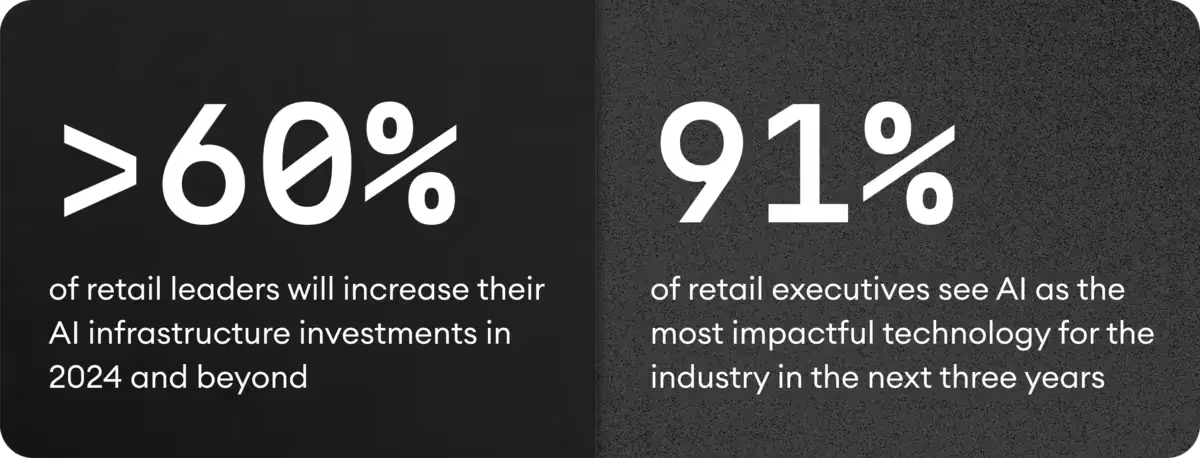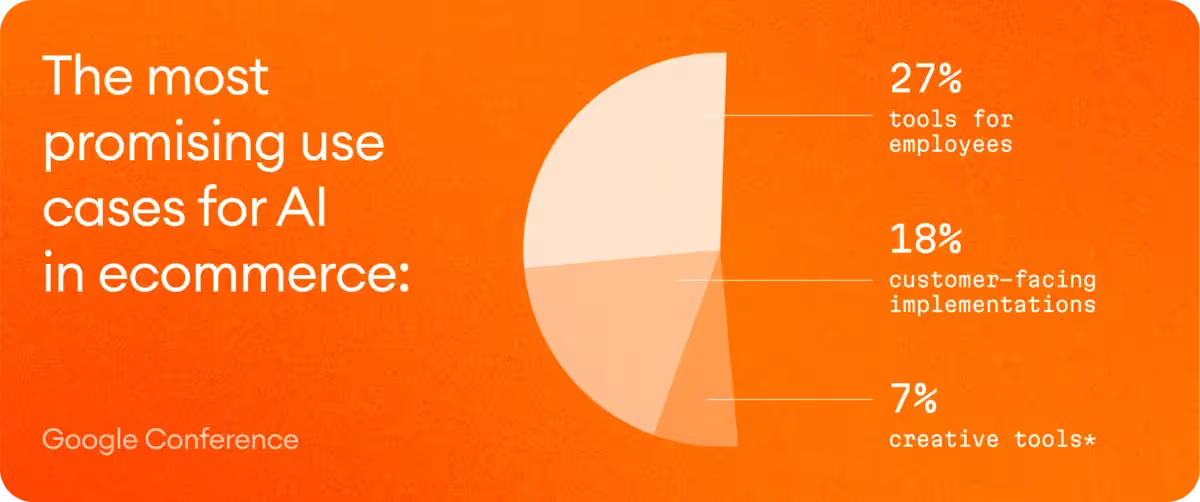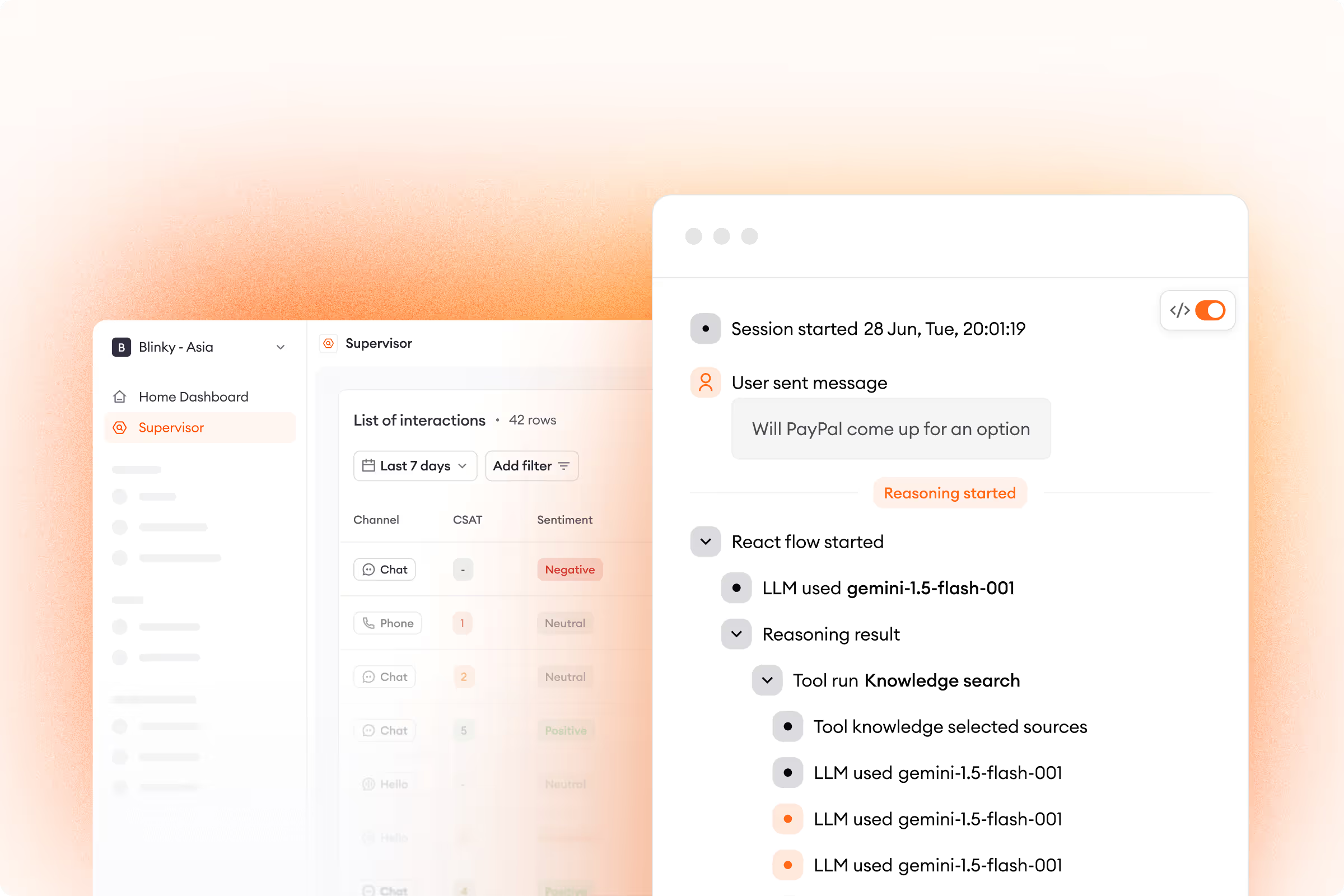Plugging AI into your e-commerce operations is beneficial, but what type of solutions will give you the greatest return for your investment? If you want to reduce costs and boost revenue in one fell swoop, prioritize customer experience.
Over 60% of retail leaders will increase their AI infrastructure investments in 2024 and beyond. 91% of retail executives see AI as the most impactful technology for the industry in the next three years.
When it comes to AI adoption across the board, it’s still early. Integrating advanced artificial intelligence into your ecommerce technology stack can give you a huge advantage compared to the many other companies that are lagging.
The best quick win that you can achieve is to prioritize AI integration in customer experience.

The most beneficial business areas to implement AI
At a recent Google conference, 101 major brands showcased their most promising use cases for this technology. Looking through these projects, there’s one thing that jumps out:
Customer experience is the most beneficial area for AI implementation in ecommerce.
18% were customer-facing implementations, such as the smart sales assistant in Mercedes Benz’s online storefront, or ING Bank’s chatbot that helps answer customer questions.
27% were tools for employees, like Victoria’s Secret’s AI agents that help in-store associates recommend better products to customers, or Verizon’s smart platform to boost the productivity of customer experience teams.
Interestingly, only 7% were creative tools, like the Carrefour Marketing Studio which builds personalized marketing campaigns for social media.
In 2023, many professionals thought that marketing and customer acquisition were the most promising areas to implement AI. As time passed, the technology has matured, the top brands have tested it across different operations and adjusted their course accordingly.
That course? For most of them it’s better customer experience, improved either through customer-facing or employee-facing AI-powered tools.

Customer experience for generating revenue in ecommerce
At a local mom-and-pop shop, selling through service is fairly easy. Hire personable people, teach them how to be nice and how to deal with difficult customers, basic common sense stuff.
After all, as the YouTube classic from a decade ago goes, “service is selling, and selling is service!”
But when it comes to selling through service as part of your ecommerce customer experience, this is a revolutionary ability that used to be nearly impossible to achieve.
You’re managing an ecommerce business that, and I’m willing to bet my kidney on it, operates across several different markets. So, on a daily basis, you’re:
- Managing your inventory,
- Processing orders,
- Shipping them within and beyond your country’s borders,
- Dealing with returns,
- Fighting to maintain your position in SERP,
- Attracting customers with ads, social media, emails, special offers and landing pages…
…plus a thousand other things I won’t mention to spare you the anxiety attack. On top of all that, how are you supposed to make sure that every customer interaction is not only pleasant, but also boosts your revenue potential?
You don’t have to, because AI can now make sure of it for you.
Mom-and-pop experience at global scale used to be impossible
Before the current AI revolution, maintaining a positive customer experience in ecommerce as your shop grew in scale used to be a complex process:
- Establish SOPs and knowledge bases.
- Hire and train more service agents.
- Outsource service to 3rd party companies.
- Build self-service options like FAQ.
- Expand into more channels with social media, live chat, phone, and email.
The costs would keep growing, while the quality of service would usually degrade as your operations scaled up. Customer service agents have a lot on their plate:
- Responding to customer questions about products, shipping, returns, exchanges, order status, and providing general assistance.
- Helping customers place or edit their orders.
- Providing information and recommendations to customers who aren’t sure what to buy.
- Resolving customer issues as fast as possible, while making the customer feel heard, cared for, and satisfied.
- Documenting customer interactions and recording information in their company’s CRM or other service platform.
- Identifying and reporting site usability issues, bugs, or recurring customer pain points to relevant teams, as agents are the first to learn about any problems impacting the customer experience.
As scale grows, more things start falling through the cracks. You get more sales but your costs keep growing, and you start missing out on many opportunities to turn an unhappy customer into a returning customer, or an indecisive one into a loyal patron.
The worst thing about it is that it takes a while to notice that this is happening. Everything seems to be going well until you start getting more negative reviews and comments accusing you of not caring about customers. Before you’re able to notice and resolve these issues, they’re already impacting your revenue potential.
Scaling customer service while saving costs and boosting revenue
It doesn’t have to be that way, and technology has finally caught up to the needs of modern ecommerce customer experience.
With an AI-powered platform, your customer experience can scale easily:
- An AI agent can fully resolve over 70% of ecommerce questions.
- AI can also provide personalized product recommendations, and it’s there to support your customers wherever they shop from, in any language they’re using and any timezone they’re in.
- Boost conversion rates by 18%, upsell, and prevent cart abandonment by proactively reaching out to shoppers that are browsing your store.
- Human agents can focus on where they’re needed most, as AI uses sentiment recognition to understand if a customer is too angry and should be contacted by a person, or if the case is too complicated for the AI to resolve.
- Insights from all tickets are collected in a single place, where you can identify any issues with your store, catalog, or service operations and evaluate if your fixes are improving the situation.
The result? You can finally provide a white-glove experience at scale, without overspending, while also having a positive impact on revenue.
.avif)
If you want to optimize for revenue, integrate AI in customer experience
While many ecommerce companies implement AI in marketing or logistics, customer experience stands out as the area with the most potential for transformative results:
- You already have rich data for AI training – CX operations are typically built on extensive knowledge bases, defined SOPs, established workflows, brand guidelines, and templated responses. This is a great foundation for training AIs.
- You can immediately influence revenue – your marketing strategies and assets are likely already at a high level, AI here will provide only incremental improvements. In customer experience, it can directly influence purchasing decisions, upsell opportunities, and customer retention.
- Scale without sacrificing quality – AI can handle any increase in customer interactions with consistent quality and personalization, something that's challenging to achieve with traditional, rule-based automation.
- Continuous improvement – AI analyzes patterns in customer interactions, learning how to improve and giving you valuable insights for refining your store.
AI integration in customer experience gives you the opportunity for a holistic improvement across core business metrics. Never forget, “service is selling” and Zowie is here to help you do both.

.avif)

.avif)
.svg)







